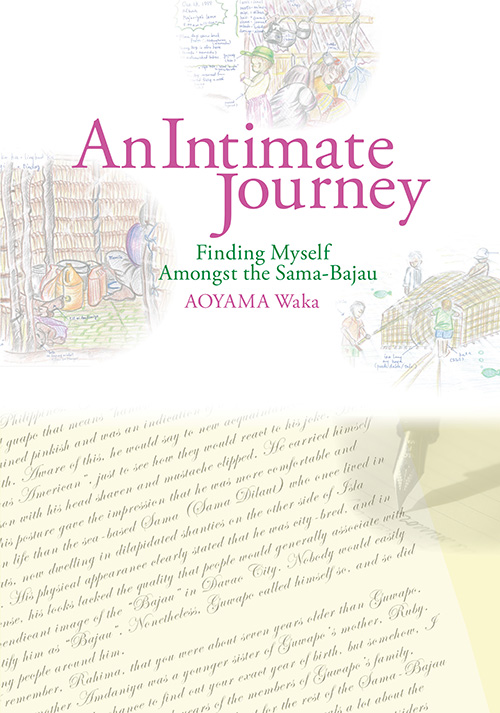
Title
An Intimate Journey Finding Myself Amongst the Sama-Bajau
Size
444 pages, B5 format, hardcover
Language
English
Released
March, 2020
ISBN
9784814002788
Published by
Kyoto University Press + Trans Pacific Press
Book Info
See Book Availability at Library
Japanese Page
This book describes how six migrant families from the Sama-Bajau cultural minority and their descendants survive each day, amid difficult circumstances, in the city of Davao on the island of Mindanao in the southern Philippines. The most striking aspect of their lives is epistolary storytelling to “absent” community members (those who have died and those yet to be born).
The ethnographic investigation this book is based on took place over a long period, from 1997 to 2019. Notably, in the first three and a half years, while studying for an Economics PhD in Davao, I engaged in integrated field study there myself, examining the economic, political, and religious lives of the Sama-Bajau people using quantitative and qualitative methods. Existing research about the Sama-Bajau mainly comprises anthropological studies of them as “people of the sea” living in Maritime Southeast Asia. There has, however, been very little examination of the lives of Sama-Bajau people forced into cities due to conflict in the southern Philippines and the resulting deterioration in their security. In that regard, this book breaks new ground and has documentative and historical value.
This book was written in English, first and foremost from a desire to reach the people of the Philippines, including the Sama-Bajau. However, the fact that it is written in English actually makes it inaccessible to all but a few of the local people in the region where the study was carried out. This is because, while school attendance and literacy rates are rising, reading English is not currently a part of daily life in the research site. Therefore, I have an obligation to communicate the content of this book orally, as a storyteller, to the local people who were kind enough to do the same for me. That said, I am overwhelmingly more familiar with written rather than spoken narrative, and thus, before telling the story aloud, I had to first commit it to paper.
This book is also unique in having opted for narrative knowledge rather than logical positivist knowledge. This choice was made because, when embarking on the book, I found meaning in the fact that I was retelling things that the local people had told me (I was producing a “narrative of narratives”). As the re-teller of stories, my only existence is as the “self” generated through the interaction between the person telling the tale and the listener. Putting it another way, I can only tell the story if I do not, as mentioned by Descartes, create a separation between my own self and the observed other. To explain the knowledge production method and the nature of the self generated within such interaction with others, the book relies on the concept of “the self of intimacy” proposed by US philosopher Thomas P. Kasulis in Intimacy or Integrity: Philosophy and Cultural Difference (2002) (Japanese translation by Masaaki Kinugasa, published by Hosei University Press, 2006).
(Written by AOYAMA Waka, Professor, Institute for Advanced Studies on Asia / 2021)
Table of Contents
Photos
Author’s Bibliography
Acknowledgements
Introductory Letter: Before Embarking on a Long Journey
Letters
1 The Bajau in Davao City Under Mayor Duterte’s Administration in the Late 1990s
2 Guwapo’s Family
3 Mama Biraiya’s Family
4 Papa Melcito’s Family
5 Kaluman’s Family
6 Magsahaya’s Family
7 Living a New Life as ‘Christian Bajau’: From the Experience of Pastor Joseph’s Family
Concluding Letter- An Intimate Reflection: After a Long Journey
Epilogue: Nakajima Takahiro’s Comments and the Author’s Reply
Glossary
Notes
Bibliography
Geographical Name Index
Personal Name Index
Subject Index



 Find a book
Find a book

